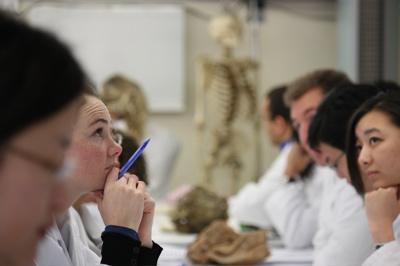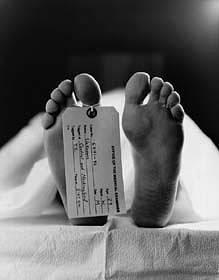Donated to Science
Interview with
There's a 10 minute sample of Paul Trotman's film Donated to Science below...
Kat - Would you donate your body to science after your death? We've had a few people on
Twitter, saying whether they would or not. Some people say they already had - hopefully they mean they have already arranged to donate, not thay're already dead and still on Twitter. Some people flat out refusing and others who know they should, but just can't bring themselves to do it. So what is it that actually drives someone to make this decision? We're joined here by Paul Trotman who's a physician and a film maker from New Zealand, who's created the film, Donated to Science. Looking at this exact issue from both the donor's perspective and that of the medical student. Hi, Paul.
 Paul - Hi. How are you?
Paul - Hi. How are you?
Kat - Yeah, good. Thanks for coming on the show. Let's just ask you a little bit about the background to this. Why did you decide to do this? It's a bit of a macabre subject.
Paul - I've been making medical films now for about ten years, even when I was first qualified, I actually moved from New Zealand to the UK, and spent my time doing locums and writing comedy in Edinburgh festival shows, and that sort of thing. I swore that the last two things I was going to do would be make documentaries or do medical stuff. I've ended up doing both and I'm having an absolute ball. So, you never know. I had just made a film about how you become an organ donor and we followed or recreated the journey of a couple of people to becoming organ donors. I used an actor to play the part of the donor, but then interviewed parents of people who'd become donors or partners of people who'd become donors, and all of the doctors and surgeons involved along the way. We ended up with a very powerful film about that sort of journey and I thought, well the other one that's similar is people donating their bodies to the medical school. But there's no way anybody would ever let me do a film like that. So, I was talking to a friend who worked in the anatomy department who said, "Well, go and talk to the professor within the department because she's quite interested in that sort of thing." And in the end, getting permission to make the film was actually the easiest part of it. I went to her, she had literally just come out of a meeting with some of the undertakers in the town who said, ":We really need something to show the members of the public who are wanting to donate their bodies what happens." Then I walked in the door and said, "I would like to make a film about people donating their bodies." And after six months of applications to ethics committees and examiners of anatomy and all that sort of thing, we got the permission. It's probably the only film that's ever been made that needed ethics committee clearance to make it.
Kat - Quite probably. So, how many people did you talk to and what sort of reasons did they give for wanting to give their bodies?
Paul - What we did was we contacted everybody on the list that were going to donate their body to the medical school and asked if they were interested, and we filtered them down, and we ended up interviewing six people of whom, three made it into the film. The reason that the three made it into the film was that, they knew that they were dying, they knew that we would get to film their particular bodies. The reasons people gave, the most common one was, "Me or a member of my family has had a lot of input from the health profession over the years and I just want to give something back." The next reason was, "I don't really want to have a funeral. I don't like funerals. I don't want to leave that as a burden on my family." And the third reason was, "Well, I'm not going to need it. I'll be dead."
Kat - I guess so. But you followed all these people all the way through and then talked to medical students as well. Now, how did the medical students feel about this whole thing because they - didn't they get to hear from the people who donated their bodies?
Paul - Yeah. What we did was we literally interviewed these patients and then waited for them to die. And then on the first day of med school, I stood up in front of the class and we said, "We're making a documentary. We're looking for volunteers." And we started off with about 30 volunteers from a class of about 200, and we whittled them down to about 20, who we followed all the way through. We had a couple of dropouts and we used about 10 of those students in the film. I think partly because they were in the film, they actually put a little bit more thought into what they were doing, and initially, we hadn't had the idea that you mentioned before, which is that, once they'd finished the dissection and we've done their last interview with them about what the dissection was like, and we filmed them saying goodbye to the body, and heading away, we said to them, "Would you guys like to see the interviews with the people you dissected?" Every single one of the student said yes. So we arranged a showing to show them these interviews with the donors and then we interviewed them again straight afterwards. We literally took them out of the viewing room where they watched the interview and then said, "Okay. What was it like?" And we got the most extraordinary reactions. A complete range from, "This guy is the same age as my father. He died young without any grey in his hair and I've just taken him to pieces." Through to, "I wish I'd seen this at the start because I now understand that there's really no connection between the person when they were alive and what remained of them that I dissected."
Kat - What do you hope to achieve with this film? Do you hope to achieve more people leaving their bodies to science or maybe more respect for students working with people?
 Paul - I think really, all I want to do is let people know what happens and what happens to their bodies, and how they're treated. To let people look inside the dissection room, and then let people make their own minds up. I really didn't have an agenda when I set out to make the film at all. It was just to make a good film and to take people somewhere where they hadn't been before.
Paul - I think really, all I want to do is let people know what happens and what happens to their bodies, and how they're treated. To let people look inside the dissection room, and then let people make their own minds up. I really didn't have an agenda when I set out to make the film at all. It was just to make a good film and to take people somewhere where they hadn't been before.
Kat - What has the response been like from people who have seen the film?
Paul - It's been very interesting. I mean, getting the film made in the first place was the easy bit. Getting somebody to broadcast it was a lot more difficult. It was initially with Television New Zealand who then changed their mind and decided it was too hard for them. Went to Television 3 in New Zealand which is another broadcaster who said yes and then got cold feet, but then stuck with it. When it was broadcast, there was an amazing reaction. It got huge audiences and the whole country was talking about it the next day and everybody was positive. The Professor of anatomy tried to walk across the university the next morning and barely made it from the number of people who stopped her. I happened to be working at the hospital at the time and the person I was looking for was just rolling her eyes whenever we got to another ward on our ward rounds, as somebody will say, "Paul, I saw your film last night. It was really amazing." I got the sort of reviews that I never, ever dreamed of getting. Just absolutely, praise from every quarter. It was just amazing.
Kat - Do you hope to take it further afield to maybe other countries in the world, perhaps here in the UK?
Paul - Yeah. It would be great. At the moment, we've got a showing at the Royal College of Surgeons next week on Thursday (13th January 2011) as part of their public education programme and it's a free showing, and they've got a booking number on their website, but it would be really nice to get it broadcast on TV here.
Kat - It does sound absolutely fascinating and have you got any plans to do this kind of thing again or are you going to turn to a different subject for your next documentary?
Paul - I've just finished a film about pig cell transplants, but we're also making a sequel to this film where we're following the same medical students through their clinical training on the wards. And again, we're not looking at the sort of physical - what they do. We're looking at the emotional impact that some of the things that happen to medical students have on the students.
Kat - And having known medical students, my ex-boyfriend was a doctor, it is amazing how wrapped up they get in it and then also in some ways, how detached they get from it. Are you hoping to capture those kind of feelings?
Paul - Yeah. What we found in this film was that the students actually grew up a huge amount between the day before they'd been in the dissection room for the first time, and the day they left the dissection room nearly two years later. And we're noticing similar sort of changes now as we're filming them on the wards. They're becoming a little bit more hardened to what's going on around them and they're finding some things incredibly difficult.
Kat - Wow! I really can't wait to see the next film that you make, but thanks very much for talking to us. That's Paul Trotman.
| A clip of Paul Trotman's film Donated to Science |
References
- Previous In the Dissection Room
- Next Naked Engineering - Artificial Limbs










Comments
Add a comment